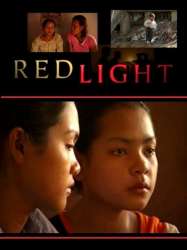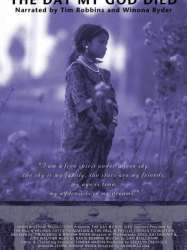Falang: Behind Bangkok's Smile est un film de genre Drame
Falang: Behind Bangkok's Smile (2005)

Si vous aimez ce film, faites-le savoir !
- Infos
- Casting
- Infos techniques
- Photos
- Vidéos
- Passages TV
- Citations
- Personnages
- Musique
- Récompenses
Durée 43minutes
Themes L'enfance, Sexualité, Erotique, Prostitution, Documentaire sur le droit, Documentaire sur une personnalité, Documentaire sur la prostitution, Documentaire sur la maltraitance des enfants, Maltraitance des enfants
Note64%










Bangkok Girl is a documentary film that was both produced and directed by Jordan Clark. It is a low-budget film, having cost $10,000 to produce, and takes sex tourism in Bangkok as its subject. Bangkok Girl is 43 minutes long and focuses on Pla, a bargirl who is 19 years old and who guides Clark through the city. The film explores Pla's background and how she came to be where she is. Pla began working as a bargirl at the age of 13, and, while she had managed to avoid being prostituted up until the point that the documentary was filmed, the film suggests that she will eventually be forcibly prostituted. In November 2005, the film aired on "The Lens", a program on Canada's CBC Television. Sweden's Sveriges Television also aired the film. In 2011, Tara Teng, a Canadian contemporary abolitionist who was Miss Canada at the time, said that her first impetus to combat human trafficking came from watching Bangkok Girl. In one scene of the film, Pla looks into the lens of the camera and says "No one cares about me." Teng said that this line changed her life. She further said that, at the time, she could not understand how a person could believe their personal worth was determined by the amount of money a person would pay for them.
Commentaires
Postez un commentaire :
Suggestions de films similaires à Falang: Behind Bangkok's Smile
Il y a 69949 ayant les mêmes genres cinématographiques (dont 102 ayant exactement les mêmes 3 genres que Falang: Behind Bangkok's Smile), 11686 films qui ont les mêmes thèmes (dont 5 films qui ont les mêmes 9 thèmes que Falang: Behind Bangkok's Smile), pour avoir au final 70 suggestions de films similaires.Si vous avez aimé Falang: Behind Bangkok's Smile, vous aimerez sûrement les films similaires suivants :

Redlight (2009)
Réalisé par Adi Ezroni
Origine Etats-Unis
Genres Documentaire, Policier
Thèmes L'enfance, Esclavagisme, Sexualité, Erotique, La pédophilie, Prostitution, Documentaire sur le droit, Documentaire sur une personnalité, Documentaire sur la prostitution, Documentaire sur la maltraitance des enfants, Maltraitance des enfants
Acteurs Lucy Liu, Reena
Note73%






Nefarious: Merchant of Souls (2011)
, 1h36Réalisé par Benjamin Nolot
Origine Etats-Unis
Genres Documentaire, Policier
Thèmes L'enfance, Esclavagisme, Sexualité, Erotique, La pédophilie, Prostitution, Documentaire sur le droit, Documentaire sur une personnalité, Documentaire sur la prostitution, Documentaire sur la maltraitance des enfants, Maltraitance des enfants
Acteurs Bill Oberst Jr.
Note73%





The first scene of the film is a reenactment of a kidnapping. A girl is kidnapped and brought to the apartment of a criminal organization, where she is confined with other girls in a room with a creaky ceiling lit by a flickering lightbulb. The girls are naked and cry from fear as men examine them and shout commands and threats at them. One girl is dragged away into another room. The girls are then brutally abused until they become sexually submissive. These events take place in a small European town, possibly in Moldova. The film asserts that 10% of the population of Moldova has been sexually trafficked. From there, the film tracks the girls through Serbia and Croatia to Amsterdam's red-light district and markets in Berlin and Las Vegas. Among legal prostitution in cities, the slavery goes undetected. Slaves are depicted in confinement, at their places of work, and as they are sold. Many of the girls are orphans and all are either initially kidnapped or tricked into forced prostitution. The methods that the traffickers use to keep the girls include hard drugs, mind control, and both sexual and physical abuse.

Tělo Bez Duše (1996)
Genres Documentaire
Thèmes L'enfance, Sexualité, Erotique, Homosexualité, Prostitution, Documentaire sur le droit, Documentaire sur l'homosexualité, Documentaire sur une personnalité, Documentaire sur la prostitution, Documentaire sur la maltraitance des enfants, Maltraitance des enfants, LGBT, LGBT
Note66%






Pas ma vie (2011)
, 1h23Réalisé par Richard Young
Origine Etats-Unis
Genres Documentaire, Policier
Thèmes L'enfance, Esclavagisme, Maladie, Sexualité, Erotique, La pédophilie, Prostitution, Documentaire sur le droit, Documentaire sur une personnalité, Documentaire sur la prostitution, Documentaire sur la santé, Documentaire sur la maltraitance des enfants, Folie, Le handicap, Maltraitance des enfants
Acteurs Glenn Close
Note77%





Ce film dépeint les pratiques cruelles et déshumanisantes de la traite des êtres humains et de l'esclavage moderne à l'échelle mondiale. Filmé sur cinq continents, dans une douzaine de pays, "Not My Life" emmène le spectateur dans un monde où des millions d'enfants sont exploités via un panel stupéfiant de pratiques, incluant le travail forcé, le tourisme sexuel, l'exploitation sexuelle, et les enfants soldats.

Prisoners of a White God (2007)
, 51minutesGenres Documentaire
Thèmes Le thème de l'éducation, L'enfance, Esclavagisme, Religion, Sexualité, Erotique, Prostitution, Documentaire sur le droit, Documentaire sur une personnalité, Documentaire sur la politique, Documentaire sur la prostitution, Documentaire sur la religion, Documentaire sur la maltraitance des enfants, Politique, Maltraitance des enfants

The Day My God Died (2003)
Origine Etats-Unis
Genres Documentaire
Thèmes L'enfance, Esclavagisme, Sexualité, Erotique, La pédophilie, Prostitution, Documentaire sur le droit, Documentaire sur la prostitution, Documentaire sur la maltraitance des enfants, Thriller érotique, Maltraitance des enfants
Acteurs Tim Robbins, Winona Ryder
Note80%






The Eyes of Tammy Faye (2000)
, 1h18Origine Etats-Unis
Genres Drame, Biographie, Documentaire
Thèmes Religion, Sexualité, La télévision, Homosexualité, Documentaire sur une personnalité, Documentaire sur la religion, LGBT, LGBT
Acteurs Tammy Faye Messner, RuPaul
Note71%






Eros + Massacre (1969)
, 3h22Réalisé par Yoshishige Yoshida
Origine Japon
Genres Drame, Biographie, Documentaire
Thèmes Film libertaire, La mer, Politique, Sexualité, Transport, Erotique, Politique
Acteurs Mariko Okada, Toshiyuki Hosokawa, Yūko Kusunoki, Yoshisada Sakaguchi
Note73%





Le film relate la vie de Sakae Osugi, anarchiste et militant japonais, assassiné par la police militaire durant les troubles qui ont suivi le grand tremblement de terre du Kantô de 1923. Le film expose ses relations avec trois femmes différentes : sa femme Yasuko Hori, la militante féministe Itsuko Masaoka, et sa dernière amante Noe Itō, auteur anarchiste et féministe assassinée en même temps que lui. La narration suit deux étudiants, Eiko Sokuta et son ami Wada, qui découvrent en 1969 les idées politiques et le concept d'« amour libre » formulé par Ōsugi.

India's Daughter (2015)
, 1h3Réalisé par Leslee Udwin
Origine Royaume-uni
Genres Drame, Biographie, Documentaire, Historique, Policier
Thèmes Sexualité, Le viol, Documentaire sur le droit
Note81%





Le film documentaire retrace l'affaire du viol collectif ainsi que sur les témoignages des proches de la victime et de ses parents y sont présentés, ainsi que ceux des agresseurs qui ont été interviewés sur leur lieu d'incarcération.

The Dark Side Of Chocolate (2010)
Origine Danemark
Genres Drame, Documentaire
Thèmes L'enfance, L'environnement, Esclavagisme, Documentaire sur le monde des affaires, Documentaire sur le droit, Documentaire sur l'environnement, Documentaire sur une personnalité, Documentaire sur la maltraitance des enfants, Maltraitance des enfants
Note74%





In 2001, the Chocolate Manufacturers Association formed an action plan entitled the Harkin-Engel Protocol aimed at ending child trafficking and slave labor in the cocoa industry.
 Connexion
Connexion